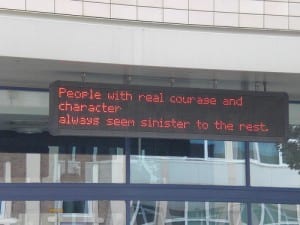
I find these meetings quite useful, partly because they’re a good way of keeping up to date with what colleagues are doing across the region (and to tell others what we’re doing), partly because there are often demonstrations of useful new technologies, and partly because Blackboard themselves come in and tell us what they’re up to. So I took myself off to De Montfort University, Leicester where I was delighted to find this dot matrix screen urging worthy thoughts on passers by. Actually I wouldn’t have seen it if I hadn’t turned down the wrong road. There may be a lesson in that.
Image credit http://www.flickr.com/photos/amyjaneb/2790492590/sizes/m/
Anyway. Among the highlights of the meeting were a demonstration of Blackboard 9.1 which De Montfort, Northhampton and Dudley College are going for. Most others there seemed to share our view that the new interface was too big a change, for their staff. That said it is a bullet we are going to have to bite soon enough, and there is some quite attractive new functionality in 9.1. It supports anonymous marking which is something that there is a lot of local interest in at Lincoln. I do have some reservations about their interpretation of “anonymous”. You can certainly hide the students’ names in the gradebook, but as you can turn this feature on and off at will, it doesn’t seem to me to be all that anonymous. Compared with the same feature in the Turnitin Gradebook, where if you turn anonymity off , you can’t turn it back on. (And it records the user identification of the user who has turned it off, who has to enter a reason for turning it off before it actually turns it off. (I hope you’re paying attention. There’ll be a test later). There was also a nice link between the gradebook and the wiki feature. Now you can go straight to a user’s contributions to a wiki from the gradebook entry, whereas before you had to use the wiki’s page history to see who had contributed what. Finally we were shown what Blackboard call a “mashup”. Data purists will point out that it isn’t a mashup at all, but is simply a way of integrating material on Flickr, You Tube, and other social networking sites (and acknowledging it’s provenance) into a Blackboard item. It’s actually quite a slick feature, and technically doesn’t breach anyone’s copyright, although I still think it would be wiser to restrict your use of such materials to those with a creative commons license.
An interesting feature was that the demonstration was streamed live from Dudley College using Elluminate which seemed to work quite well, and may be a useful way of delivering lectures and other teaching interventions remotely.
The other big product that was demonstrated was Echo 360, a lecture capture system. Essentially this works by the lecturer walking into the room, switching it on, and it records everything that happens. (audio, video, and even co-ordinates any slides that might be displayed) As it records a “thumbnail” is created every minute, (it looks a bit like the “scene” menu on a DVD) so it is easy for students to navigate through the lecture to any particular scence they are interested in. As you might have expected there was some scepticism that such a tool would deter students from attending, but in fact those who had attended claimed that they found the reverse was true. If anything, recorded lectures had a slightly higher attendance than non-recorded lectures, possibly because if it was thought worth recording, that sent the message that it was worth attending. And as one colleague pointed out, the lecturer always has the option of saying…
“And the questions on the exam will be….” (Presses pause). (Presses play). “…Oh, you’re watching the recording are you? Oh dear!”
Although that is perhaps a little cynical. The point is that the recordings can be integrated into a Blackboard course thus providing a service for students who are genuinely unable to attend, or need to revise the finer points of a lecture. Neither there is much of an issue in terms of data storage as Echo host all the data, although the university or the authors of the data retain full intellectual property rights in it.
Of course I couldn’t get the sales people to admit how much it would cost. All they would say was that they had a wide range of licensing models. We’d also have to consider which rooms we’d want to equip with the service, but an increasing number of universities are offering this type of facility, so if we want to remain competitive, it is perhaps something we should investigate further.
You must be logged in to post a comment.